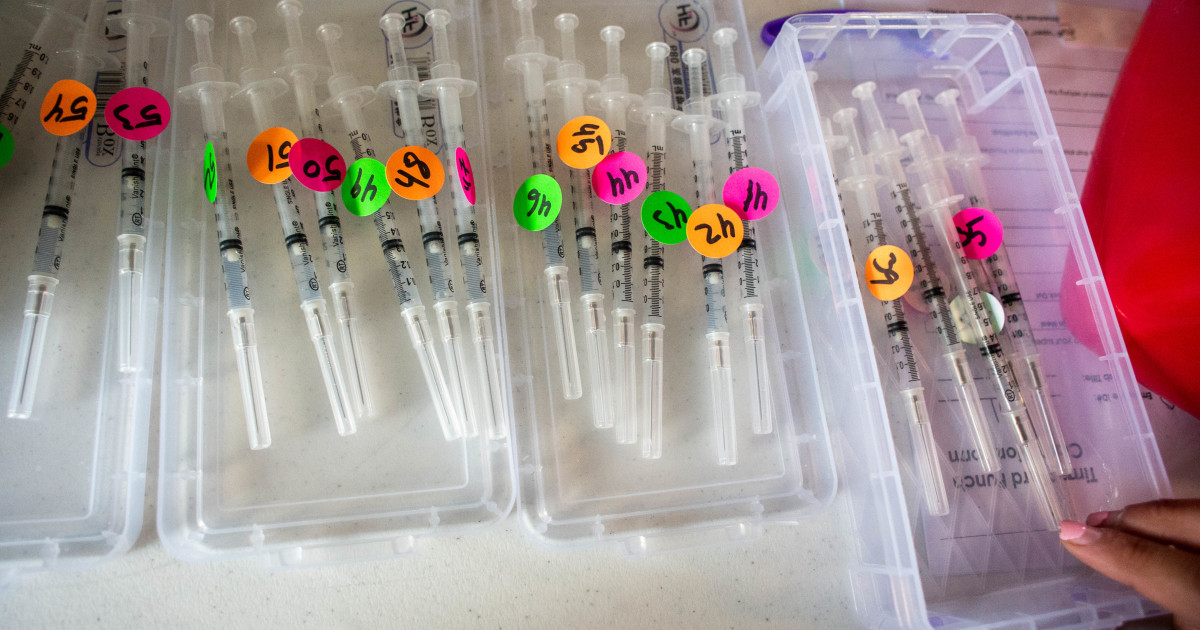
Vaccine distribution is ramping up in many countries, but with Covid-19 cases also climbing once again and the prospect of another surge of infections on the horizon, the world is in a race against time.
Key to winning that race, experts say, is not only whether the vaccines will play a significant role in preventing serious illness from Covid-19, but whether they can block people from spreading the virus.
“The ideal vaccine would have two performance features: One prevents you from going to the hospital, going to the ICU and losing your life,” said Dr. Peter Hotez, co-director of the Center for Vaccine Development at Texas Children’s Hospital and dean of the National School of Tropical Medicine at Baylor College of Medicine. “But if the vaccine also halts asymptomatic spread, then you could potentially vaccinate your way out of the epidemic.”
Early indications have been promising so far. The effect of vaccines on asymptomatic infection had been a big unknown, but scientists say it will be crucial to ending the pandemic.
It’s estimated that asymptomatic cases, which involve people who are infected with Covid-19 but have no symptoms, account for more than half of all transmissions of the virus, according to a recent study published in the journal JAMA Network Open by researchers at the Centers for Disease Control and Prevention. As such, if vaccines can block asymptomatic infections, they could also significantly reduce overall transmission, offering hope that the virus may soon be contained.
Vaccines can protect against transmission by reducing a person’s viral load, or how much virus is present in the body, said Dr. Becky Smith, an associate professor of medicine at Duke University.
“Theoretically, by reducing your viral load, it should prevent your ability to transmit to others,” she said. “And even if it doesn’t fully prevent transmission, it should lower it significantly.”
The focus on vaccines and transmission comes at an important juncture in the pandemic. Though cases globally fell for several weeks, some European nations are now seeing a rebound. Parts of the U.S. are also reporting an uptick, a worrisome development given that many states recently relaxed public health restrictions.
Concerns about Covid-19 variants, including strains that may be more contagious, also persist. Dr. Anthony Fauci, director of the National Institute of Allergy and Infectious Diseases and the nation’s top infectious disease expert, told NBC News’ Richard Engel Thursday that the U.S. needs to vaccinate as many people as possible to avoid further outbreaks.
Part of that strategy hinges on the effect that vaccine could have on reducing transmission.
Last week, new data from Israel, where nearly 60 percent of the country’s 9 million residents have received at least one dose of a vaccine, suggested that the Pfizer-BioNTech vaccine is 94 percent effective at preventing asymptomatic infections.
A separate study conducted by researchers at Cambridge University, in the United Kingdom, found that a single dose of the Pfizer vaccine can reduce asymptomatic infections by 75 percent. The results, which have yet to be peer-reviewed, came from an analysis of around 4,400 tests done on vaccinated health care workers in Cambridge over a two-week period in January.
In Johnson & Johnson’s trials, the company’s vaccine was found to be 74 percent effective against asymptomatic infections. And according to a report released in December 2020 by the Food and Drug Administration, early data suggested that Moderna’s vaccine may also protect against asymptomatic infections, but the company has said more research is needed.
Angela Rasmussen, a virologist at the Georgetown University Center for Global Health Science and Security, said these early findings are “very promising.” But she added that there are still some big unanswered questions.
“From the real-world data that we have so far, it does look like the vaccines have an impact on asymptomatic infection,” she said. “The real question, though, is how broad will this be?”
And since vaccines are not 100 percent effective, it’s possible that a small number of vaccinated people could become infected with the virus. If that does happen, and a vaccinated individual is asymptomatic, it’s not yet known whether that person could spread Covid-19 to others, Rasmussen said.
In a new commentary published Thursday in the journal Science, Rasmussen and Saskia Popescu, an infectious disease epidemiologist at George Mason University, detail why controlling “symptomless transmission” is critical to ending the pandemic. Symptomless transmission includes both people who have no symptoms and those who are pre-symptomatic but later go on to develop symptoms.
“As more people get vaccinated, that will have a population-wide effect on transmission, but while the majority of people right now are not vaccinated, we need to be mindful of the issue of asymptomatic and pre-symptomatic transmission,” Rasmussen said.
Most scientists agree that there are two main paths out of the pandemic: one involves reaching a threshold known as herd immunity — when enough people have developed antibodies from natural infection or from vaccines that future outbreaks are unlikely. The other requires clamping down on the spread of the virus so much that even unvaccinated portions of the population face little risk of becoming infected.
If vaccines can protect against asymptomatic infection, they could help with the latter, but the two strategies should not be mutually exclusive, Rasmussen said.
“It’s really a suite of interventions,” she said. “We need to be thinking of ways to get transmission down overall, and we need to not be relying exclusively on the vaccines.”
One way to drive down overall transmission is to heed public health measures that have been in place throughout the pandemic, such as practicing social distancing, wearing a mask and avoiding gatherings with unvaccinated people. If the virus can be adequately contained, aspects of life could return more to normal even if portions of a population are still unvaccinated, Rasmussen said.
“We don’t need to be at the herd immunity threshold to relax restrictions,” she said. “If we can get the virus to be so uncommon in the population, there won’t be a risk of people being exposed to it, whether they’re vaccinated or not.”
Source: | This article originally belongs to Nbcnews.com









